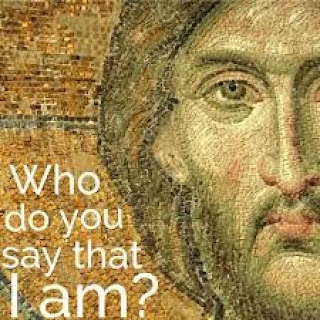A new school year—new students, new names. Lots of new names, but not all of them. One girl walked in and said "Good morning, Coach!" She paused and said "I'm sorry, I mean Ms. Stricherz." I have known this young woman for quite some time; we met through golf. "I appreciate the error. No harm, no foul—right?" I said. "We'll get there..."
I wasn't lying. I appreciate the error. I love being called "Coach," even though I'm not this year or this season. Even more, I value that this young woman recognized in the classroom, we have a different relationship. We do. In Room 202, there's no questions about our match schedule, what part of the game we are working on, or the practice plan for the week. No. In this space we are learning about Jesus through the Gospel of Matthew: RS 201 Christology. And little did she know, this conversation set the perfect context for Sunday's Gospel reading. It is one of my favorites.

Informally known as "The Jesus Question," this passage of scripture appears in all three synoptics Gospels. Who do you say that I am? is one of the most important questions Jesus chose to ask his disciples. And, it doesn't end there. It is a very personal question, too.
There are so many ways to think of Jesus: a prophet, a holy man, teacher and spiritual leader. One answer I think that bears consideration is: the great questioner. How? Why?
As taught by Dan Groody, CSC
- In the Gospels, Jesus is asked 187 Questions
- Jesus answers 3 Questions
- Jesus asks 307 Questions
- For every question Jesus answers, He asks 100.
What does this reveal about Christ the Teacher?! What does it suggest to you? Jesus wants to know what we hear and what we think? Jesus helps us come to our own answers? Maybe Jesus knows we are all dealing with our own questions. One of which is Who you say that I am?
Jesus' question bares consideration beyond just what type of teacher He was. I believe His question invites further reflection because they are questions of identity and relationship. I would argue one is not entirely separate from the other—both personally and professionally.

Who we are and how we understand our selves—and one another—is always rooted in our relationships. I am the daughter of Stan and Sheila, the sister of Mark and Sarah. I am a Godmother, aunt, cousin and friend. I teacher and I have been a coach. While relationships change, others are essential our very being. Though I am not a coach to a group of girls at St Ignatius where I teach right now, I have been and I am to others and that relationship has meaning. Otherwise, my student wouldn't default to that title.
Some might argue that names or titles—words we use to speak about our relationship—don't matter. I disagree. Some time ago, I ran a half marathon with (my then) boyfriend. Our relationship wasn't in a good place. As Neil Diamond sang it was "love on the rocks." The last mile of the race, I was slowing down. I told him to finish strong. I said, Go ahead. I'll see you after! After the race, amidst thousands of finishers, I couldn't find him. When I did, I found him talking to a friend from high school. We hugged, high-fived and he introduced me to his buddy. "Anne, this is Matt. Matt, this is my girlfriend, Anne," he said. For a brief moment, I wasn't sure what he was going to say. I remember my relief. Why? That term had meaning; it has meaning. It's not used to introduce just anyone. It speaks to a unique relationship that two people share and respect.

If you ever doubt the significance of your role as a coach just consider as Father John Cusick invited coaches to do at a conference entitled "Coaching is Calling" in Chicago 1998, that apart from Father or Sister, "coach" is the only person in the school who is called by their title. He pointed out that students don't say "teacher" or "principal" but the coach they call "coach." Father Cusick reflected on what it was like after his ordination to suddenly have people calling him "Father." He felt good about the fact that people were giving him the sign of respect after all those years of preparation but also felt the sense of responsibility that went along with this title and role. Likewise, when our students call us "coach" this is a sign of respect, but there is also a great responsibility to be a positive influence in their lives.
I agree. How we see ourselves and others is worth reflection and consideration. Being a friend always comes as a cost. There is a certain responsibility that goes with it—if you take it seriously. Those whom we know as coach, a teacher, our parent or the principal invites have a responsibility to us and others. William O'Malley, SJ writes "The first step toward wisdom is to call a thing by its right name. Then you'll handle it as it deserves." Are they not worthy of our respect?
 |
| Year 24. Tom Brady retired after 23.... |
Jesus' question Who do you say that I am? is just one of the many ways this great teacher invited us to consider who we are and what we value. How I answer HIS question in unfolding. It has deepened as a result of teaching this class. My relationship with Christ is on-going and one that essential to my understanding of self. My sophomores have been invited to consider His question this year. As their teacher, I hope they'll develop an answer for themselves...
Photo Credits
Jesus
Jesus Teacher
Questioner
source
https://sportsandspirituality.blogspot.com/2023/08/why-names-and-titles-matter-lessons.html





Comments
Post a Comment